Unit 1 What's the matter? SectionA1a-2d课件38张人教版八年级英语下册
文档属性
| 名称 | Unit 1 What's the matter? SectionA1a-2d课件38张人教版八年级英语下册 | 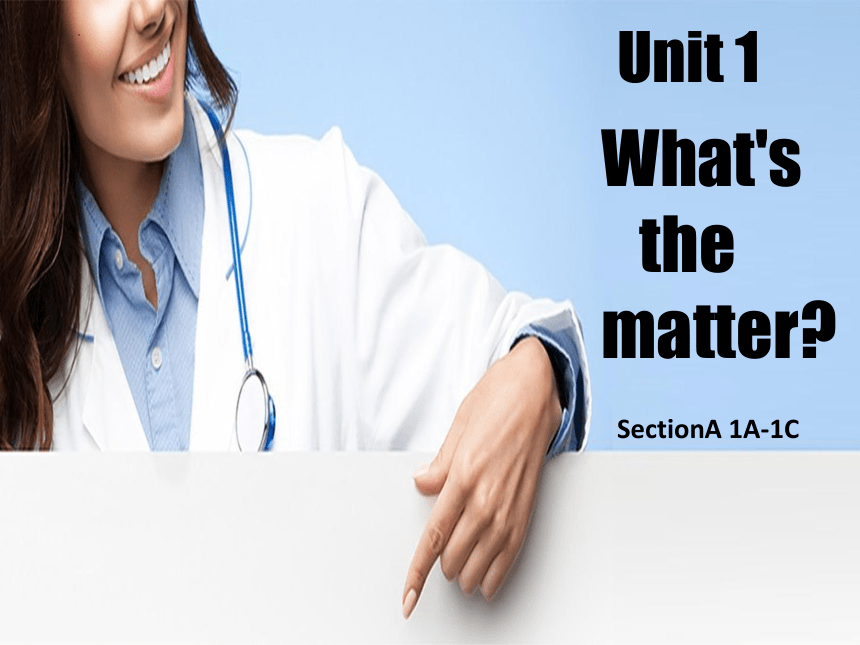 | |
| 格式 | pptx | ||
| 文件大小 | 23.0MB | ||
| 资源类型 | 教案 | ||
| 版本资源 | 人教新目标(Go for it)版 | ||
| 科目 | 英语 | ||
| 更新时间 | 2022-03-17 09:11:00 | ||
图片预览

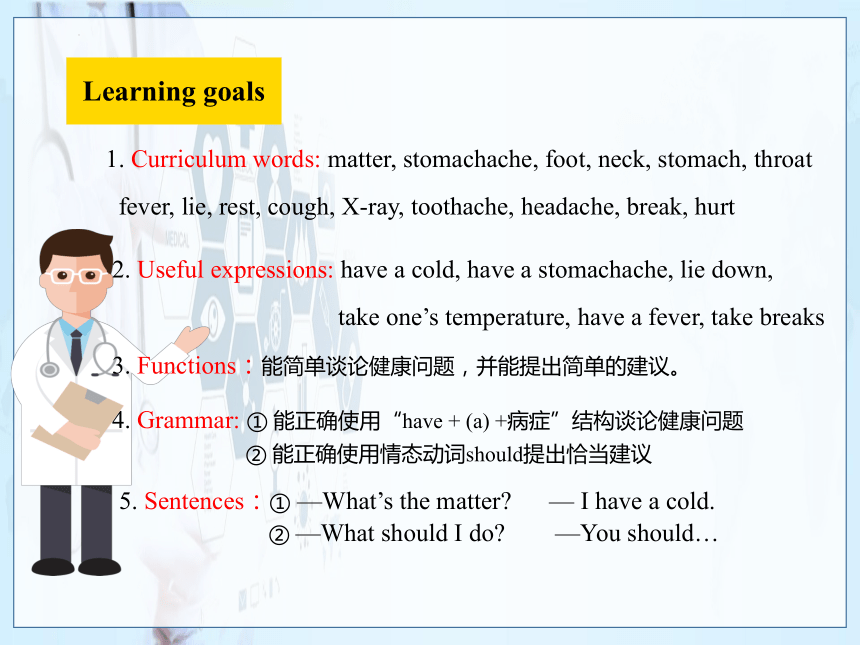
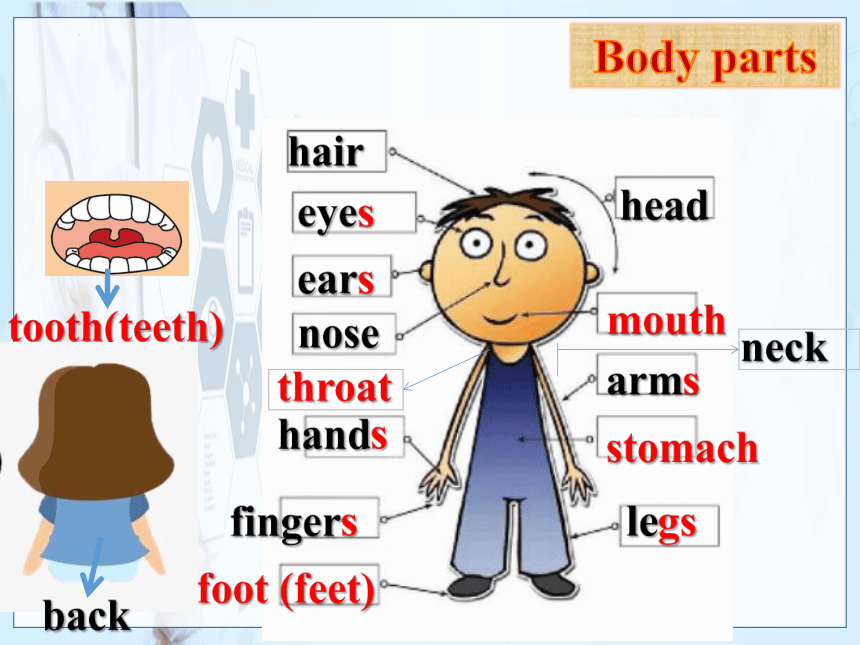
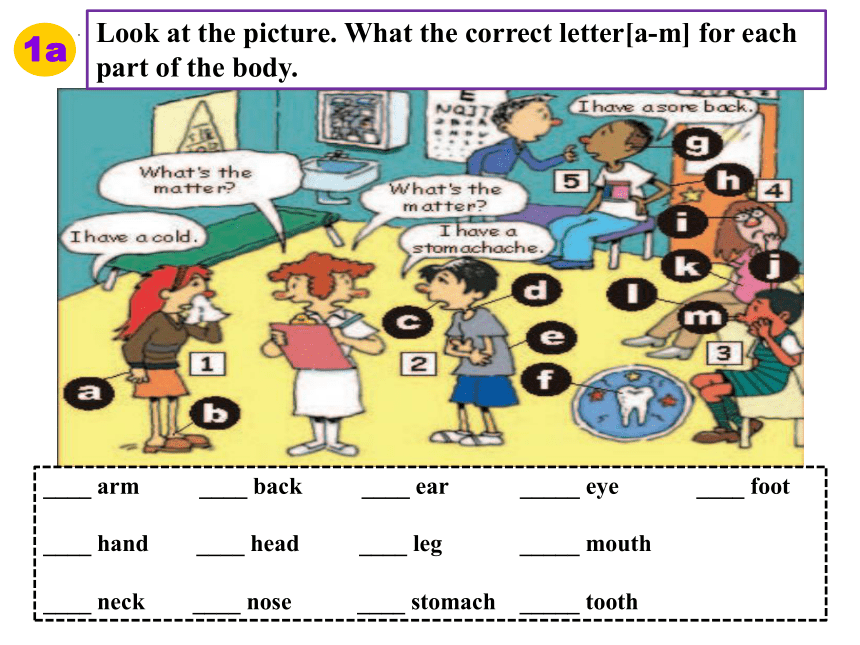
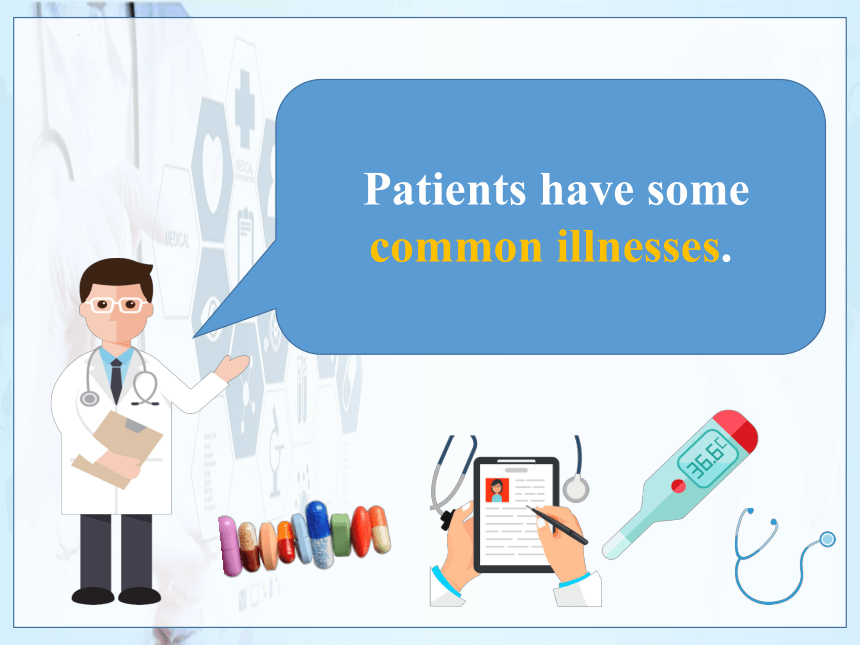
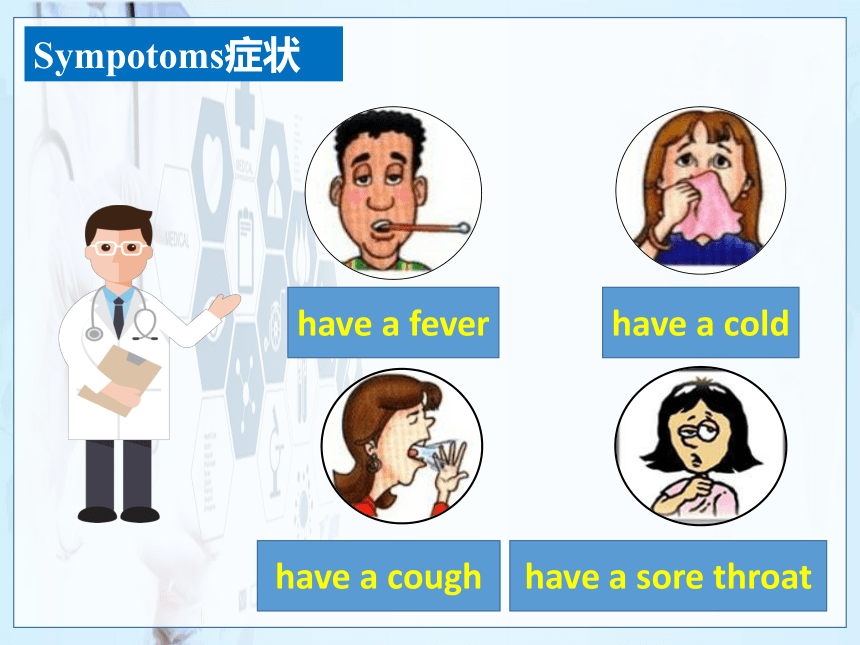
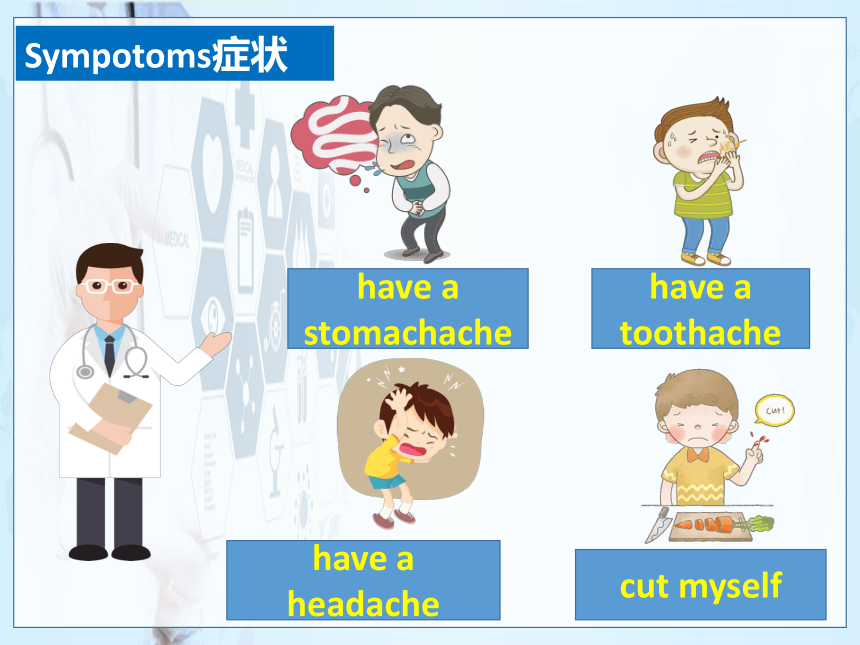
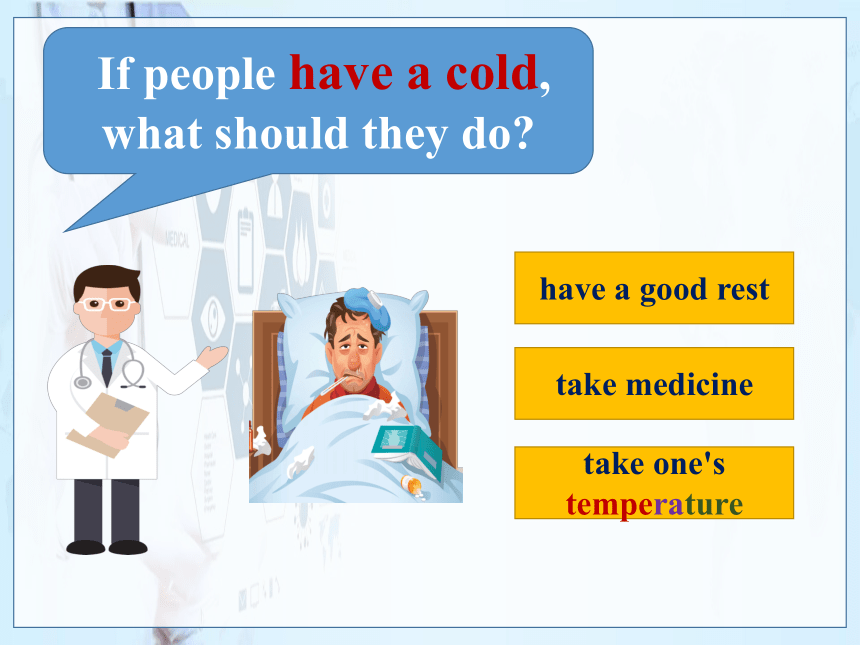
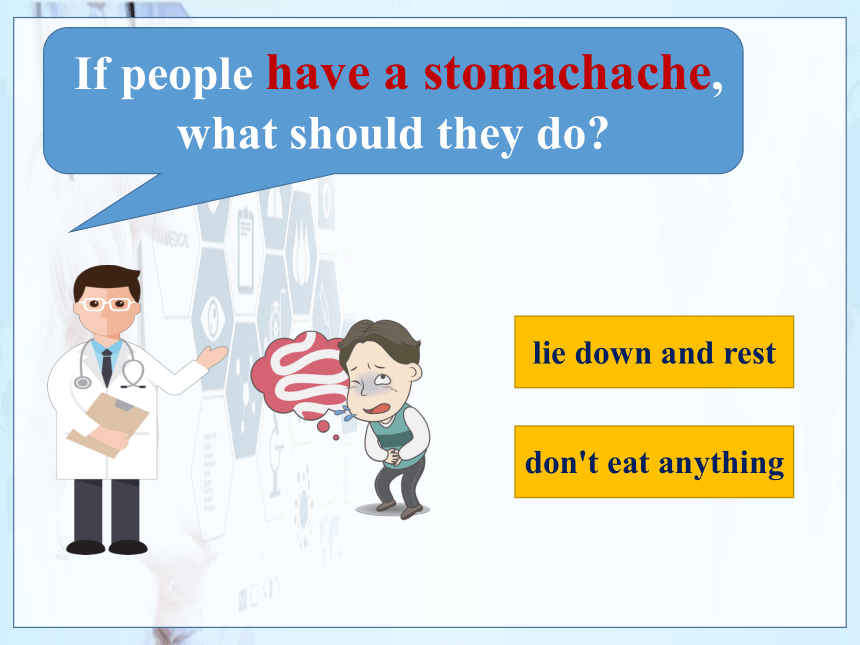
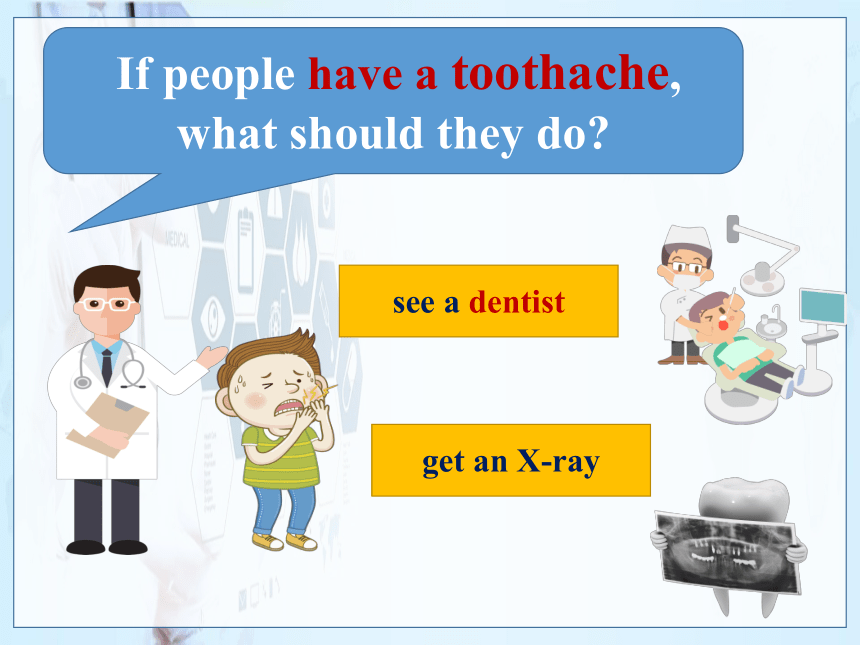
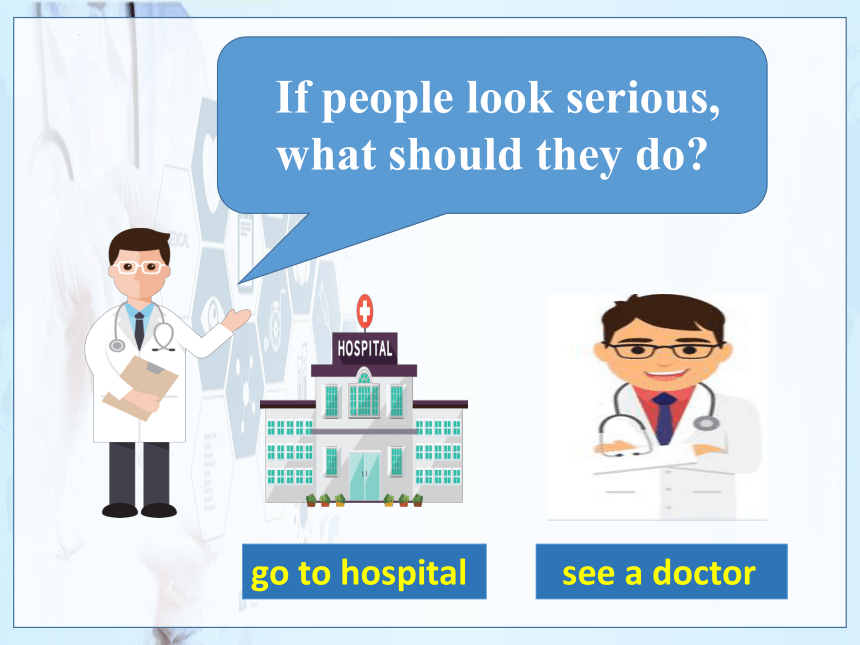
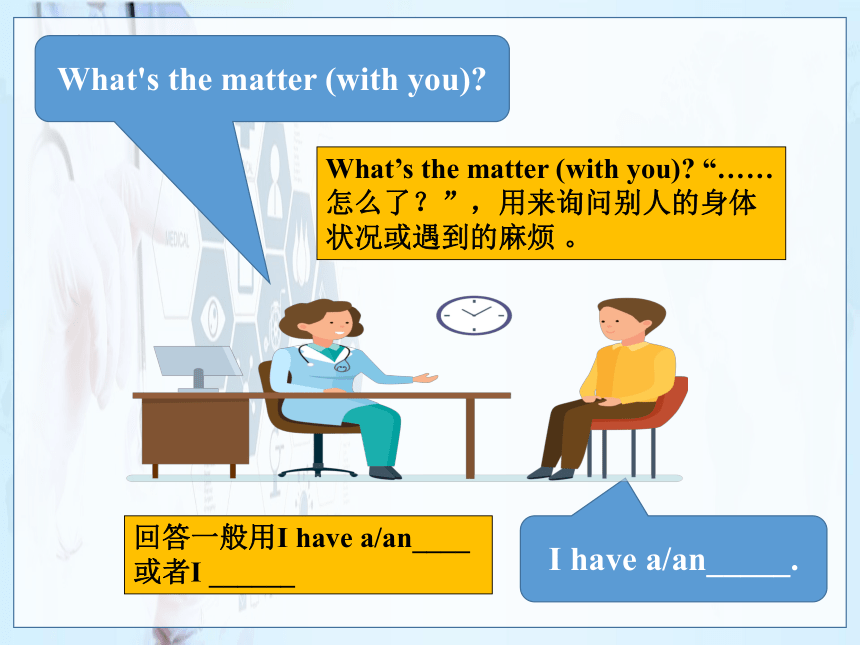
文档简介
(共38张PPT)
Unit 1
What's
the matter
SectionA 1A-1C
Learning goals
1. Curriculum words: matter, stomachache, foot, neck, stomach, throat
fever, lie, rest, cough, X-ray, toothache, headache, break, hurt
2. Useful expressions: have a cold, have a stomachache, lie down,
take one’s temperature, have a fever, take breaks
3. Functions:能简单谈论健康问题,并能提出简单的建议。
4. Grammar: ① 能正确使用“have + (a) +病症”结构谈论健康问题
② 能正确使用情态动词should提出恰当建议
5. Sentences:① —What’s the matter — I have a cold.
② —What should I do —You should…
Body parts
head
ears
eyes
mouth
arms
stomach
hair
nose
hands
fingers
foot (feet)
legs
throat
neck
tooth(teeth)
back
1a
Look at the picture. What the correct letter[a-m] for each part of the body.
____ arm ____ back ____ ear _____ eye ____ foot
____ hand ____ head ____ leg _____ mouth
____ neck ____ nose ____ stomach _____ tooth
Patients have some common illnesses.
Sympotoms症状
have a fever
have a cold
have a cough
have a sore throat
Sympotoms症状
have a stomachache
have a toothache
have a headache
cut myself
If people have a cold,
what should they do
have a good rest
take medicine
take one's temperature
If people have a stomachache,
what should they do
lie down and rest
don't eat anything
If people have a toothache,
what should they do
see a dentist
get an X-ray
If people look serious,
what should they do
go to hospital
see a doctor
What's the matter (with you)
What’s the matter (with you) “……怎么了?”,用来询问别人的身体状况或遇到的麻烦 。
I have a/an_____.
回答一般用I have a/an____或者I ______
What's the matter (with you)
I have a/an_____.
I cut myself.
Practice
Common illnesses
What’s the matter with him/her
_______ has a cold.
_______ has a fever.
_______ has a cough.
_______ has a stomachache.
_______ has a headache.
_______ has a sore throat.
_______ has a toothache.
has a toothache
has a cold
has a sore back
got a stomachache
last night
has a very sore throat
While-listening
Nancy:
Sarah:
Ben:
David:
Judy:
What’s the matter with them
Listen again and fill in the blanks.
1b
1c
Look at the picture. What are the students' problems
Make conversations.
A: What's the matter with Judy
B: She has a sore throat .
What's the matter
Look at the pictures and make
predictions.
Predicitons
What's the matter with her/him
She has a sore throat.
He has a toothache
He has a stomachache
She has a fever.
She cut herself.
Predicitons
Can you give her/him advice
She has a throat.
He has a toothache
He has a cold.
She has a fever.
She cut herself.
drink hot water
see a dentist and
get an X-ray
have a good rest
take her tempareture
put some medicine on it
2a
Listen and number the pictures [1-5] in the order you
hear them.
2
1
3
5
4
While-listening
2b
Listen again. Match the problems with the
advice.
fever
stomachache
cough and sore throat
toothache
cut myself
lie down and rest
drink some hot tea with honey
see a dentist and get an X-ray
take your temperature
put some medicine on it
While-listening
MMA
Let's role-play a conversation. One student is a doctor, another one is a patient.
Pair-work
A: What's the matter
B: My head feels very hot.
A: Maybe you have a fever...
B: What should I do
A:YOU....
2c
Make conversations using the information in 2a and 2b.
What’s the matter (Section A 1a-2b)
Structures
Health Problems
Advice
Parts of body
—What’s the matter with you —I have a cold.
—What should I do —You should lie down and rest…
have a headache
have a fever
have a sore back
take one’s temperature
lie down and rest
take breaks away from the computer
see a dentist and get an X-ray
arm
leg
nose
have a sore throat
ear
back
have a stomachache
stomach
tooth
foot
have a cold
eye
hand
head
have a toothache
have a cough
Healthy problmes---Summary
1. 牙疼
2. 胃疼
3. 背疼
4. 头疼
5. 喉咙疼
6. 发烧
7. 感冒
have a toothache
have a stomachache
have a backache
have a headache
have a sore throat
have a fever
have a cold
8. 躺下并且休息
9. 喝热蜂蜜茶
10. 喝大量水
11. 看牙医
12. 量体温
13. 看医生
lie down and rest
drink hot tea with honey
drink too much water
see a dentist
take one’s temperature
go to a doctor/see a doctor
KEY
Pha-rses
What's the matter
Exercises
1. 他在骑车时伤到了自己。
He__________when he rode a bike.
2. —怎么了?—我胃痛。
—_______ the matter
—I ______ a stomachache.
3. 你咳嗽嗓子疼要多喝蜂蜜水。
You have a cough and __________, please drink hot tea
_________.
4. “你怎么了?” “我发烧了”
—What's wrong with you
—I ___________ (发烧了。)
5. 你为什么不躺下好好休息?
Why not__________ and have a good rest
6. 你看起来不太好,你需要去看医生。
You didn't feel well. You need to ____________.
完成句子。
cut himself
What's
have
sore throat
with honey
have a fever
lie down
see a doctor
THANKS
谢谢聆听!
2d
Mandy: Lisa, are you OK
Lisa: I have a headache and I can’t move my neck. What should I do
Should I take my temperature
Mandy: No, it doesn’t sound like you have a fever. What did you do on the
weekend
Lisa: I played computer games all weekend.
Mandy: That’s probably why. You need to take breaks away from the computer.
Lisa: Yeah, I think I sat in the same way for too long without moving.
Mandy: I think you should lie down and rest. If your head and neck still
hurt tomorrow, then go to a doctor.
Lisa: OK. Thanks, Mandy.
Role-play the conversation.
2d
Read the conversation and answer the questions.
1. What's the wrong with Lisa
2. What did Lisa on the weekend?
3. What should Lisa do
She has a headache and she can't move her neck.
She played computer games all weekend.
She lie down and rest. If her head and
neck still hurt tomorrow, then goes to
a doctor.
It is really normal for common
people to have healthy problems.
If we have healthy a problem.
We need to go to hospital and
see a doctor. In daily life, we need
to take up healthy eating habits,
regular exercises, the most
important thing is to have a good
mood.
What's the matter
Language
Points
1. What's the matter 怎么了?
matter(n) 问题;事情
Eg: Is there any matter 有什么问题吗?
We have more important matters to do.
我们有更重要的事情要做。
matter(v) 要紧;关系重大
Eg: It doesn't matter. 不要紧,没关系。
What's the matter
Eg: Is there any matter 有什么问题吗?
We have more important matters to do.
我们有更重要的事情要做。
matter(v) 要紧;关系重大
Eg: It doesn't matter. 不要紧,没关系。
1. What's the matter 怎么了?
What's the matter
该句型常用来询问某人发生了什么不愉快的事情或者周围发生了什么事情,意为“怎么了?/出了什么事?”。 用于健康话题时,旨在询问某人哪里不舒服。其后可加介词with,引出询问的对象。
Eg: ---What's the matter
--- I failed the math exam.
Eg: --- What's the matter with him
--- He has a bad cold.
【扩展延伸】
常用于询问疾病、不适以及突发情况的表达还有:
What's wrong (with)...
What's the trouble (with)...
1. What's the matter 怎么了?
【扩展延伸】
常用于询问疾病、不适以及突发情况的表达还有:
What's wrong (with...)
What's the trouble (with...)
What happened (to...)
Is there anything wrong (with...)
Did you get/catch..
【真题再现】
---Hi, Bob. You don't look well. What's the matter
____ you
--- I talked too much and didn't have any water last
night. I have a sore throat now.
A. in B. of C. with
2. I have a cold. 我感冒了。
【have的用法小结】have 作实义动词时,有很多用
法,要注意后面宾语的搭配。
I have a book. (我有一本书。)
I have a big breakfast. (我吃了一顿丰盛的早餐。)
I have/take a shower. (我洗澡。)
I have a cold. (我感冒了。)
I have a picnic.(我去野餐。)
have在此处作及物动词,意为“患病”,可以与get或catch互换。cold前可以用bad、heavy等词修饰。
Eg: Because the temperature dropped sharply, many
students caught a bad cold. 由于气温骤降, 许
多同学得了重感冒。
3. I have a stomachache. 我胃疼。
【扩展延伸】
人体部位+ache 常表示“......疼”,常见的还有:
tooth+ache=toothache head+ache=headache
back+ache=backache heart+ache=heartache
stomachache作名词,由stomach(胃;腹部)+ache
(疼痛)构成。
Eg: He has a bad stomachache because of eating too
much. 他因为吃得太多而导致胃疼。
【真题再现】
I didn't have breakfast this morning, so my _____
comes to me.
A. headache B. heartache C. toothache D. stomachache
4. I have a sore back. 我背痛。
sore (adj) 疼痛的;酸痛的
sore作形容词,在句中作定语或者表语。
have a sore+身体部位 表示“......痛”。
Eg: Do you have a sore throat
My legs are sore because of running yesterday.
back (n) 在此处作名词,意为“背;背部”。
back to back表示“背靠背”。
Eg: He stands with his back to the door. 他背对着门站着。
We sat the ground bcak to back. 我们背对背坐在地上。
【扩展延伸】
back作名词还有“后面”的意思。at the back of “在......的后面”。Eg: He sat at the back of the car.
他坐在小汽车的后排。
Unit 1
What's
the matter
SectionA 1A-1C
Learning goals
1. Curriculum words: matter, stomachache, foot, neck, stomach, throat
fever, lie, rest, cough, X-ray, toothache, headache, break, hurt
2. Useful expressions: have a cold, have a stomachache, lie down,
take one’s temperature, have a fever, take breaks
3. Functions:能简单谈论健康问题,并能提出简单的建议。
4. Grammar: ① 能正确使用“have + (a) +病症”结构谈论健康问题
② 能正确使用情态动词should提出恰当建议
5. Sentences:① —What’s the matter — I have a cold.
② —What should I do —You should…
Body parts
head
ears
eyes
mouth
arms
stomach
hair
nose
hands
fingers
foot (feet)
legs
throat
neck
tooth(teeth)
back
1a
Look at the picture. What the correct letter[a-m] for each part of the body.
____ arm ____ back ____ ear _____ eye ____ foot
____ hand ____ head ____ leg _____ mouth
____ neck ____ nose ____ stomach _____ tooth
Patients have some common illnesses.
Sympotoms症状
have a fever
have a cold
have a cough
have a sore throat
Sympotoms症状
have a stomachache
have a toothache
have a headache
cut myself
If people have a cold,
what should they do
have a good rest
take medicine
take one's temperature
If people have a stomachache,
what should they do
lie down and rest
don't eat anything
If people have a toothache,
what should they do
see a dentist
get an X-ray
If people look serious,
what should they do
go to hospital
see a doctor
What's the matter (with you)
What’s the matter (with you) “……怎么了?”,用来询问别人的身体状况或遇到的麻烦 。
I have a/an_____.
回答一般用I have a/an____或者I ______
What's the matter (with you)
I have a/an_____.
I cut myself.
Practice
Common illnesses
What’s the matter with him/her
_______ has a cold.
_______ has a fever.
_______ has a cough.
_______ has a stomachache.
_______ has a headache.
_______ has a sore throat.
_______ has a toothache.
has a toothache
has a cold
has a sore back
got a stomachache
last night
has a very sore throat
While-listening
Nancy:
Sarah:
Ben:
David:
Judy:
What’s the matter with them
Listen again and fill in the blanks.
1b
1c
Look at the picture. What are the students' problems
Make conversations.
A: What's the matter with Judy
B: She has a sore throat .
What's the matter
Look at the pictures and make
predictions.
Predicitons
What's the matter with her/him
She has a sore throat.
He has a toothache
He has a stomachache
She has a fever.
She cut herself.
Predicitons
Can you give her/him advice
She has a throat.
He has a toothache
He has a cold.
She has a fever.
She cut herself.
drink hot water
see a dentist and
get an X-ray
have a good rest
take her tempareture
put some medicine on it
2a
Listen and number the pictures [1-5] in the order you
hear them.
2
1
3
5
4
While-listening
2b
Listen again. Match the problems with the
advice.
fever
stomachache
cough and sore throat
toothache
cut myself
lie down and rest
drink some hot tea with honey
see a dentist and get an X-ray
take your temperature
put some medicine on it
While-listening
MMA
Let's role-play a conversation. One student is a doctor, another one is a patient.
Pair-work
A: What's the matter
B: My head feels very hot.
A: Maybe you have a fever...
B: What should I do
A:YOU....
2c
Make conversations using the information in 2a and 2b.
What’s the matter (Section A 1a-2b)
Structures
Health Problems
Advice
Parts of body
—What’s the matter with you —I have a cold.
—What should I do —You should lie down and rest…
have a headache
have a fever
have a sore back
take one’s temperature
lie down and rest
take breaks away from the computer
see a dentist and get an X-ray
arm
leg
nose
have a sore throat
ear
back
have a stomachache
stomach
tooth
foot
have a cold
eye
hand
head
have a toothache
have a cough
Healthy problmes---Summary
1. 牙疼
2. 胃疼
3. 背疼
4. 头疼
5. 喉咙疼
6. 发烧
7. 感冒
have a toothache
have a stomachache
have a backache
have a headache
have a sore throat
have a fever
have a cold
8. 躺下并且休息
9. 喝热蜂蜜茶
10. 喝大量水
11. 看牙医
12. 量体温
13. 看医生
lie down and rest
drink hot tea with honey
drink too much water
see a dentist
take one’s temperature
go to a doctor/see a doctor
KEY
Pha-rses
What's the matter
Exercises
1. 他在骑车时伤到了自己。
He__________when he rode a bike.
2. —怎么了?—我胃痛。
—_______ the matter
—I ______ a stomachache.
3. 你咳嗽嗓子疼要多喝蜂蜜水。
You have a cough and __________, please drink hot tea
_________.
4. “你怎么了?” “我发烧了”
—What's wrong with you
—I ___________ (发烧了。)
5. 你为什么不躺下好好休息?
Why not__________ and have a good rest
6. 你看起来不太好,你需要去看医生。
You didn't feel well. You need to ____________.
完成句子。
cut himself
What's
have
sore throat
with honey
have a fever
lie down
see a doctor
THANKS
谢谢聆听!
2d
Mandy: Lisa, are you OK
Lisa: I have a headache and I can’t move my neck. What should I do
Should I take my temperature
Mandy: No, it doesn’t sound like you have a fever. What did you do on the
weekend
Lisa: I played computer games all weekend.
Mandy: That’s probably why. You need to take breaks away from the computer.
Lisa: Yeah, I think I sat in the same way for too long without moving.
Mandy: I think you should lie down and rest. If your head and neck still
hurt tomorrow, then go to a doctor.
Lisa: OK. Thanks, Mandy.
Role-play the conversation.
2d
Read the conversation and answer the questions.
1. What's the wrong with Lisa
2. What did Lisa on the weekend?
3. What should Lisa do
She has a headache and she can't move her neck.
She played computer games all weekend.
She lie down and rest. If her head and
neck still hurt tomorrow, then goes to
a doctor.
It is really normal for common
people to have healthy problems.
If we have healthy a problem.
We need to go to hospital and
see a doctor. In daily life, we need
to take up healthy eating habits,
regular exercises, the most
important thing is to have a good
mood.
What's the matter
Language
Points
1. What's the matter 怎么了?
matter(n) 问题;事情
Eg: Is there any matter 有什么问题吗?
We have more important matters to do.
我们有更重要的事情要做。
matter(v) 要紧;关系重大
Eg: It doesn't matter. 不要紧,没关系。
What's the matter
Eg: Is there any matter 有什么问题吗?
We have more important matters to do.
我们有更重要的事情要做。
matter(v) 要紧;关系重大
Eg: It doesn't matter. 不要紧,没关系。
1. What's the matter 怎么了?
What's the matter
该句型常用来询问某人发生了什么不愉快的事情或者周围发生了什么事情,意为“怎么了?/出了什么事?”。 用于健康话题时,旨在询问某人哪里不舒服。其后可加介词with,引出询问的对象。
Eg: ---What's the matter
--- I failed the math exam.
Eg: --- What's the matter with him
--- He has a bad cold.
【扩展延伸】
常用于询问疾病、不适以及突发情况的表达还有:
What's wrong (with)...
What's the trouble (with)...
1. What's the matter 怎么了?
【扩展延伸】
常用于询问疾病、不适以及突发情况的表达还有:
What's wrong (with...)
What's the trouble (with...)
What happened (to...)
Is there anything wrong (with...)
Did you get/catch..
【真题再现】
---Hi, Bob. You don't look well. What's the matter
____ you
--- I talked too much and didn't have any water last
night. I have a sore throat now.
A. in B. of C. with
2. I have a cold. 我感冒了。
【have的用法小结】have 作实义动词时,有很多用
法,要注意后面宾语的搭配。
I have a book. (我有一本书。)
I have a big breakfast. (我吃了一顿丰盛的早餐。)
I have/take a shower. (我洗澡。)
I have a cold. (我感冒了。)
I have a picnic.(我去野餐。)
have在此处作及物动词,意为“患病”,可以与get或catch互换。cold前可以用bad、heavy等词修饰。
Eg: Because the temperature dropped sharply, many
students caught a bad cold. 由于气温骤降, 许
多同学得了重感冒。
3. I have a stomachache. 我胃疼。
【扩展延伸】
人体部位+ache 常表示“......疼”,常见的还有:
tooth+ache=toothache head+ache=headache
back+ache=backache heart+ache=heartache
stomachache作名词,由stomach(胃;腹部)+ache
(疼痛)构成。
Eg: He has a bad stomachache because of eating too
much. 他因为吃得太多而导致胃疼。
【真题再现】
I didn't have breakfast this morning, so my _____
comes to me.
A. headache B. heartache C. toothache D. stomachache
4. I have a sore back. 我背痛。
sore (adj) 疼痛的;酸痛的
sore作形容词,在句中作定语或者表语。
have a sore+身体部位 表示“......痛”。
Eg: Do you have a sore throat
My legs are sore because of running yesterday.
back (n) 在此处作名词,意为“背;背部”。
back to back表示“背靠背”。
Eg: He stands with his back to the door. 他背对着门站着。
We sat the ground bcak to back. 我们背对背坐在地上。
【扩展延伸】
back作名词还有“后面”的意思。at the back of “在......的后面”。Eg: He sat at the back of the car.
他坐在小汽车的后排。
同课章节目录
- Unit 1 What's the matter?
- Section A
- Section B
- Unit 2 I'll help to clean up the city parks.
- Section A
- Section B
- Unit 3 Could you please clean your room?
- Section A
- Section B
- Unit 4 Why don't you talk to your parents?
- Section A
- Section B
- Unit 5 What were you doing when the rainstorm came
- Section A
- Section B
- Review of Units 1-5
- Unit 6 An old man tried to move the mountains.
- Section A
- Section B
- Unit 7 What's the highest mountain in the world?
- Section A
- Section B
- Unit 8 Have you read Treasure Island yet?
- Section A
- Section B
- Unit 9 Have you ever been to a museum?
- Section A
- Section B
- Unit 10 I've had this bike for three years.
- Section A
- Section B
